Ancient civilisations, modern polytheism, and a humanity that links them both. ***This blog is archived.***
Don't wanna be here? Send us removal request.
Text
I was rambling on the issue of museums and human remains and how certain populations are more likely to have their bodies put on display to be gawked at and then went "well I guess the Pompeii casts were of Europeans. there are bones in there right?" and Googled it to make sure, at which point I confirmed that yes there are bones in there, but more interestingly DNA testing revealed that a cast of an adult holding a child everyone assumed was a mother and child were, in fact, a man and a kid entirely unrelated to him. Honestly that's more moving to me. Maybe they were connected in a way other than blood, but maybe a stranger saw a child when the world was ending and thought the one thing he could do was hold them.
#so. i know i don't post here anymore#but i saw this and had to share#i'm a teacher now and just spent today with my class of 5-6 year olds#according to the articles i read - the kid this post is referring to was 5-6 years old#and yeah. i get it.#i understand the man holding this child. it's not your child but you hold them anyway.#as always the past is tied to the present#and across time i understand this man.
48K notes
·
View notes
Text
I'm going to bring this blog out of hiatus for this. I don't care that it has nothing to do with what I used to post about. I need you all to know that there is still a war going on and it's killing good people.
I didn't know ykp-chk well. I followed her blog and interacted with her a few times. Once was near the start of winter, she asked for advice on how to keep a fire going so she could stay warm through the night, and I asked my mother for tips and shared them with her. Once was to send her a poem I'd written for the ЗСУ.
She was a combat medic. She was German and chose to come to Ukraine to help. I can't imagine the pain her loved ones are going through now. All I can do is offer my condolences, and for what it's worth, my remembrance.
Please, read through her blog. Read her words. Read about the absolute hell she went through on the front. And why. Read about what she was fighting for.
I wish I had the bravery and the strength to fight like she did, but I don't. So I did the least I could which is donate in her honour. Please do the same if you can.
Link to @suratan-zir's pinned post, with donation links, is here.
And here is the poem I shared with her. I feel like it has a different meaning now.
Lullaby for a soldier
Someday there will be no mines. You hold the thought inside you like an icon enshrined behind closed eyes. In the evening lull, you can see it: the fields are yellow, ripening, the sky is blue and empty, the sea is endless, the bridge underwater like a prisoner's chains, shattered. The houses are mended and lived in, the junction of stones - between old and new - like ancient, long-healed scars. The engines of tractors are humming, in the street a busker is singing a song about red guelder roses. There are no more men to bury, and no more calls to rise. No more. You can rest.
Breathe: here the air smells sweet, not of ashes, but of Mama's cooking. She is slicing watermelon by the window. No ducks swim on the river but a dog is running up to you through the grass, and his fur is soft underneath your soft fingers, calluses from holding weapons now gone. You can close your eyes; you are safe. You can lie among sunflowers, on fertile soil where your once-enemies lie forever. You can dream of the dark-eyed girl on a train returning from Poland, you can dream of rings, of hearts interlinked, of faith that no one can break.
You can sleep, soldier no longer a soldier. Sleep, in this land with no war. Sleep - do not listen to the distant explosions. Sleep - let the jets turn to cranes. Sleep. You are weary from fighting for freedom. You will win it - but for now, sleep. Sleep, soldier not meant to be a soldier. Someday there will be no mines.
-
Вічна пам'ять 🌻
She's gone
This is her husband. I can hardly even type right now.
She was killed in action today.
My soulmate is gone.
1K notes
·
View notes
Text
Blog archived
Hey all, this is to give a few clarifications about my presence on Tumblr.
As of today, this blog is archived. This means I am no longer writing or reblogging posts, or answering questions. I may revive things at some point in the future, but currently I have neither time nor interest to invest in this blog. I hope you understand.
However, I am still around on Tumblr. I may occasionally like and comment on posts, and I am still contactable via asks (off anon) and DMs for the following:
Conversations with friends and other people I’ve previously interacted with in DMs*;
Inquiries about my YouTube channel (for example, whether you can use my videos in a project);
Tutoring, which I am still offering.
Lastly, I would like to thank all of you for sticking around. I’ve had this blog for five years and it’s been a wonderful resource to deepen my knowledge of various topics, to learn from all of you, and to share my passions to the best of my ability. Despite its reputation, I’ve had many great experiences on Tumblr and I’ve got you all to thank for that.
Be well, be kind to each other, and take care of yourselves. I wish you all the best.
*If you’re in this category, please don’t hesitate to ask for my Discord or Facebook ID if you want to keep in touch better!
156 notes
·
View notes
Photo

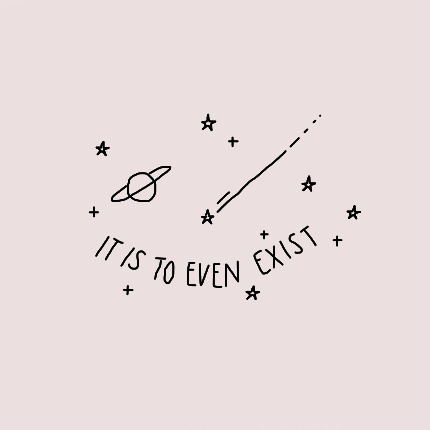
I’d give anything to hear you say it one more time, that the universe was made just to be seen by my eyes.
#this is from my favourite song - saturn by sleeping at last#it seemed like a good way to bring things to a close#this is the end of this blog for a good while at least#i'm not deleting anything i'm just moving on to other things#it's been a wonderful few years ily all <3#i hope i've helped you experience the beauty of humanity across time#and the preciousness of humans being humans no matter when we lived#...#and of course - because it has to be said - this is for my angels#remembrance is a covenant between us#always
3K notes
·
View notes
Text
Welcome to the 2020 Rural Dionysia
We are excited to announce the launch of the first edition of the Rural Dionysia. Over the past years, the City Dionysia, first held by @forthegloryofthetheoi and later passed over to @sisterofiris has known some success. It is for this reason that we decided to introduce the Rural Dionysia as a smaller event to warm us up for the Dionysian season.
As of now, the two admins are myself @thegrapeandthefig and @adri-le-chat. Our ask boxes are opened, so feel free to address questions to either one of us or directly on this blog if the need arises.
How to participate
The Rural Dionysia is meant to be a smaller competition than its urban counterpart, as such, we have selected only 3 categories:
Freestyle poetry
Modern hymns
“Complete the fragment”
As you can see, we are keeping the poetry category from the City Dionysia and adding 2 new ones. For clarity: poetry and modern hymn differ in that a poetry entry can be about anything (myth, personal religious experience, etc.), while a “modern hymn” entry has to sing the praises of a deity.
As for the “Complete the fragment” category, here is the chosen fragment for this edition:
Sappho, Fragment 43 … throws peace mind … sits down … for day is near into confusion … but come, … toil … my friends
The challenge is that the initial fragment must be included somewhere in your piece somehow in their original order. This means you can fill the gaps however you want, but you can’t switch the order of the words in your piece. For added clarity, please put in bold or underline those words in your composition, so we can spot them right away :)
Please submit your piece through submissions on this blog. Check the rules below for further information.
Calendar of the event
Nov. 15: Official announcement and opening of submissions Dec. 13: Final submission day. Dec. 15: Vote opening Dec. 26: Vote closing Dec. 28: Announcement of the winners!
No worries though! We will be posting reminders about each step when the time comes.
General rules
They are the nearly the same as for the City Dionysia, that is:
Roleplay and fanfic are not acceptable submissions. This is a religious festival, please respect our faith and do not submit an entry if you are roleplaying or writing fanfiction.
Unlike with the City Dionysia, entries do not necessarily have to be about specific deities or hellenic polytheism except for the “Modern Hymn” category, which has to be dedicated to one or many gods.
All stories, myths, and poems must be entered using the submissions button.
All entries must be tagged for the category they are being submitted to. Entries must also be tagged for potentially triggering content and squicks.
An entry may only be submitted to a single category.
Each person may only submit one entry per category each year.
Winners for each category will be decided by popular vote.
212 notes
·
View notes
Text
1st Reminder
We are already 10 days away from the deadline for submissions, that is, Sunday 13th of December.
So far, we have received 9 wonderful entries. I’m boh very happy about this and extremely grateful that we already have participants! Keep them comin’ :)
If you have missed the initial announcement and rules, you can find it here.
#rural dionysia 2020#hellenic polytheism#Hellenismos#sorry for not boosting earlier but this a really great idea!!
40 notes
·
View notes
Note
I think it’s just awful how so much mythology, folk lore, local local legends etc. Aren’t easily available online. But is their a reason why those with access to these stories aren’t able to put them online themselves?
Mainly, as far as I’m aware (keeping in mind that I’m just one person in the field and I’ve not been here for very long), the reason is copyright.
That and, to be honest, a little bit of classism (can’t have the rabble accessing our nice, bright, shiny sources!) My field, while we’re gradually accepting that you can be a Celticist coming from a lower class background, still do kind of pin a bit on the idea of the gentleman scholar - A polymath who’s already studied French, German, Latin, and Greek and who can therefore take to Old Irish and Medieval Welsh like a fish to water. For many in the field, there’s the expectation that you already have at the very least an understanding of Gaeilge, or that you already have a strong linguistic background, and that can cause a massive break between the public and the scholars involved. Especially in the instance of editions which, by their nature, are JUST the Irish, with no English translation. Because, hey, it’s just Old Irish, right? There’s a dictionary at the back!
Both UCC and UCD have, to their credit, done an IMMENSE amount of work in making these resources available to the public. UCC has done wonders with their CELT database and Irish Sagas Online, UCD with their Thesaurus Lingua Hibernicae. They’ve done a truly magnificent thing there, and I wouldn’t have been able to enter the field without the diligence and hard work of everyone involved in both projects. The problem is that many of the sources involved are…well. Old. We’ve learned a lot about the Irish language since a lot of these were done, specifically about Old Irish. A lot of them are in very archaic language, because that was the translating style at the time, and some of them cut out whole portions of text. Because it’s got to be in the public domain to be legal, unless you have an instance where the scholar is able to grant permission for their recent edition/translation to be released, such as in the case of Gray’s Cath Maige Tuired, which was given a special release on CELT. On a folkloric level, Duchas is doing amazing work.
What you have to keep in mind is that, unlike Classical studies….we’re a BABY as a field. Many texts still haven’t been translated. Many texts still haven’t even been given editions. And a LOT of work goes into making both editions and translations happen and there are…very few of us that can do the work to make it happen. I would estimate that there’s fewer than 100 Celticists worldwide. It might be as many as two hundred but I strongly doubt it. Hence why, in many of the cases, the last translation was made in either the 19th or early 20th century. It’s because, frankly, since then, no one’s had the time or energy to go over it again, and people were trying to do new editions/translations. With stories like the Iliad and the Odyssey, you can VERY easily get ahold of one of those online because, while there are a ton of newer translations that you won’t be able to get ahold of as easily (Emily Wilson’s Odyssey, for example), there are a LOT of older translations that are still very viable, because you’ve had people studying these texts for literal centuries. In our case, we’re lucky to have one older translation. We…we’ve been around for a little while, really getting our first breath of life in the 18th century, but we only really hit our golden age with the Celtic Revival and the establishment of the Republic, and then we kind of fell out of fashion. A lot of the time, when I ask my supervisor “Has anyone done anything on x subject?”, he’ll give me this kind of beleaguered “Well….”, not because Celticists haven’t cared about the material, but because their hands have been full in a hundred places.
And it’s worse for mythographers, because we are a very tiny section of Celtic Studies. Tiny. You’ll notice that, in my source list, a lot of the names repeat a lot. Why? Well, part of it’s because I personally like their work, but part of it is also that these ARE the big names in the world of the Mythological Cycle. These are the ones who are REALLY focusing and doing a ton of work on it. Other scholars might touch on it, do an article here or there, but very few really commit to it, in the end. In my own program, I’m basically the only one of the MA students with a mythological focus, and even in the department as a whole…I’m basically one of very few. Ulster Cycle and Fenian Cycle get more, but the Mythological Cycle…I don’t want to say there’s a STIGMA against it, but there’s……..a different feeling, being in it. A lot of mythological material is still being transcribed and translated, a lot of it is still being talked about for the first time, and we’re pl
In my time, I’ve done two editions/translations of a text, the latter of which was almost completely incomprehensible at points, the vellum that the ink was written on being of a very poor quality; the bottom third of so of the folio was totally faded. Both of those times, it fell to me to transcribe the material, reading it letter by letter, trying to figure out what various abbreviations meant (Irish scribes used a very specialized form of shorthand that, while perfectly comprehensible to them, isn’t always so to us), and then having to translate it, keeping in mind that in some cases, the Irish was a mixture of later Irish and Old Irish. Translating Old Irish is a bit like trying to wrestle with a snake at times - It’s unpredictable, it’s wriggly, and it feels, at times, like just when you think you’re holding onto the head, it shifts and you realize you’re holding onto the tail. It isn’t something that you can really do just because you feel in the mood to do it one day and then publish on Tumblr; it’s a VERY intense process that involves a lot of time, effort, and tears. (Seriously. A lot of tears.)
And…no one gets rich out of Celtic studies. Every one of us who’s either entering into the field or is actually in the field has accepted that it’s a labor of love; I’m statistically unlikely to get a job IN the field and I’ve accepted it. It could very well end up that I get my MA, maybe even my PhD and then…that’s it, done. Now, this isn’t meant to be a pity party, but it does explain why a lot of scholar’s can’t JUST give out pdfs of their books - They do need to get paid, at least a little, though if I’m not mistaken, once they submit their articles to a journal….that’s it. They’ve gotten as much money as they’re going to get. So that could be a factor in why articles tend to get handed out much easier. Books also….keep in mind, we don’t digitize a LOT of our stuff. It was part of why Covid kicked Celtic Studies’ ass. Suddenly, you had a bunch of scholars around the world used to having access to a library who…no longer had access to a library. Or the books in them. I was personally amazed that Tom O’Donnell’s recent book on Fosterage and Mark Williams’ Ireland’s Immortals were actually released in Ebook format, because that’s still a little on the unusual side. We’re slowly coming to terms with the 21st century, but it’s difficult.
Anyway, that’s the answer: Most of it isn’t INTENTIONALLY trying to keep the public out, and for many of the scholars, I know very well that they really want the public to have access to that stuff, but their hands are tied by copyright law + needing to make some amount of money in the very unfair world of academia. I hope that some part of this makes sense. We do want to do more work with the public, it’s just that…well. Copyright law and academia. They’re bastards.
#not my field but still interesting and relevant information#and i sympathise#this is what studying mesopotamia is like too#especially sumerian but to a lesser extent hittite as well#there's probably a couple of hundred of us at most and we have no idea what's going on half the time#you have my deepest sympathies op#academia#celtic studies#long post
251 notes
·
View notes
Note
I’ve been wondering for a while if I should write about my experiences with this topic, and now seems like a good opportunity.
For context, I’m a sex-repulsed aroace. I’ve been some form of polytheist my whole life, and I started actively involving myself in neo-pagan and New Age communities, and later the Hellenic polytheistic community, around the age of fifteen.
It’s a well-known fact that a lot of New Age, neo-pagan and polytheistic groups are sex-positive. Many people, especially LGBT+ people, come to these spiritualities to escape the sex-negativity that was forced on them by other faiths. I have deep sympathy for these people. I firmly believe that recognising sex as a part of life, even a sacred one, is a good thing. Nobody should ever feel bad about enjoying their sexuality, full stop. Nobody should be judged for being open about how sex holds a spiritual meaning to them.
But this isn’t the issue at hand. The fact is that I have consistently seen, in all the communities I’ve interacted with, a sizeable number of people portray sex (and frankly, also romance) not just as important to them personally, but as fundamental to the religion itself. There’s the emphasis on balance and moderation, and how it’s bad to fully reject a part of life (aka sexuality). There’s the reduction of Aphrodite to “Goddess of sex and love” and Dionysos to “God of sex and alcohol”. There’s the Wiccan God and Goddess being characterised by their fertility. There’s the belief that everyone has a soulmate.
And there’s the fact that people tried to push “tantra” (quote marks because the New Age version, which is heavily sexualised, has nothing to do with actual Hindu and Buddhist traditions) on me as a literal seventeen-year-old.
Curious to know how this would affect a sex-repulsed aromantic asexual, at a time before she knew any of those words existed? Here’s a few examples:
I spent years meditating on my sacral chakra (again, little to do with the Hindu concept, and not something I involve myself with anymore), which I thought was closed because I’d never felt sexual attraction. I worried that I would never be truly balanced and in touch with myself because of this.
I convinced myself that I’d been sexually abused in a past life, because I’d never been in this life, but I didn’t know how else to explain my discomfort with sexual situations.
I misinterpreted responses to my divination as Dionysos telling me to “embrace my sexuality” (direct quote from my journal), because that’s what I expected him to say.
I felt like I couldn’t worship Dionysos or Aphrodite because I didn’t have a connection to the domains I heard their devotees talk about.
I begged Aphrodite to make me more comfortable with her domains. I felt like I didn’t have a choice, because sex and romance were a necessary part of adulthood.
All of the above led me to force myself to read about subjects I was deeply uncomfortable with, and even to enter situations I didn’t want to be in, because I had to come to terms with sexuality to be a good pagan and a good person.
This isn’t even going into the experiences of people who have been sexually abused, or are uncomfortable with these topics for their own personal reasons. And as a reminder, most of the above incidents happened when I was a minor.
It’s not just exhausting. It’s harmful.
People enjoying their sexuality, and viewing it as religiously important, is not and will never be a problem. Sexuality being presented as essential to a religion, on the other hand, is a massive issue. It’s one of the reasons why I dipped my toes in several spiritual paths before leaving; I didn’t feel like I could ever be “enough”. The issue is a lot smaller in Hellenic polytheism, and I’ve seen the community become more inclusive over time, but some elements are still there. As evidenced by the ask above.
What am I suggesting should be done about it? Certainly not to get deny the sexual side of religion - I would never advocate about that, and I think Adrian and most other people in our position would agree. Rather, I think it’s important to acknowledge that everyone’s path to the divine is different, sexuality may be important to certain deities but it isn’t their be-all end-all, and nobody should have to involve themselves in something they, personally, aren’t comfortable with, for the sake of being a better devotee.
Until we’ve reached that point, we’re not taking society’s shackles off. We’re taking them off ourselves and putting them on someone else.
People are probably upset because sexuality in Christian Society is seen as icky and you should feel bed for liking it. They go to Dionysus because he tells us that these things don't make us wrong or shameful and these feelings can even be viewed as sacred, but then you, a prominent Dionysian, come into the community and make judgements about how "exhausting" people being open and free about their sexual expression is. We're taking society's shackles off and you're trying to put them back on.
I.. never said that it was bad? Like-- I like that people can express themselves sexually? It’s good? Like... I like drawing artistic nudity? I just... don’t like how other Dionysians force it onto me and others. Especially since it’s illegal.
Just... because I get tired of sexual content being forced onto me, especially when it’s illegal, doesn’t mean I think it’s bad...
Do you realise I’m human? That I have feelings? Do you, do you really?
337 notes
·
View notes
Note
I’d like to request that people who read this please don’t harass either greek-mythographer or adri-le-chat over it. For one, the above replies explain the topic clearly enough; sending hate won’t help anyone learn. For two, greek-mythographer has repeatedly stated he is done with this conversation, and I consider it important to respect that. And for three, both of them (as far as I’m aware) are minors and I heavily discourage anyone, but especially adults, from piling onto a literal child for their opinions, however ill-informed or badly expressed.
That said, I’m reblogging this because it has become a very interesting and informative post.
Sex repulsed Dionysus worshipper here too. It’s exhausting how much of his worship is surrounded in alcohol and sex. From both trauma and just general preference, it’s so nice to see other worshippers honour him in other ways. Thanks for speaking up about it.
Of course. I think I’ll try to produce some sex repulsed, ace, and non alcoholic worship of Dionysus posts because it’s definitely possible. I will be the change I want to see lmao.
392 notes
·
View notes
Text
Despite the assertions of certain scholars, there is little evidence of heteroeroticism in Archaic Greece. Meager references may perhaps be found in the Iliad. While the epic is famous for the relationship between Achilles and Patroclus and its role in turning the tide of the Trojan War, Helen and Paris, commonly interpreted by modern readers as friends, may provide a parallel to these famous lovers. Instrumental to Helen's escape to Troy with Paris was Aphrodite, whose erotic connotations are well known from Sappho's poetry. It could be argued, however shocking it may be to our modern sensibilities, that Paris and Helen's love was of a similar nature. Nevertheless, other possible mentions of "straight" people (I use quotation marks as such an identity did not exist in Ancient Greece) remain debatable. There is no evidence that Hector and Andromache's love was anything but platonic; the intimacy of their exchange in Book 6 should not be taken as heteroerotic, as declarations of strong affection between friends were common in ancient times. Neither is their marriage proof of institutionalised different-sex unions based on attraction. It is well known that most marriages were concluded for practical reasons, and romantic feelings rarely, if ever, entered the picture. As such, the question of whether "straight" people existed in Archaic Greece cannot be conclusively answered.
#this is obviously tongue-in-cheek#but i'm not entirely joking#i've been reading too many articles like this lately#ancient greece#classics#iliad#tagamemnon
9K notes
·
View notes
Text
I did a bit more research and figured out how the three books passed from the Boissiers to the Gautiers: Adolphe Boissier (1796-1856), who signed the third volume in 1812 (at the age of sixteen, similarly to Émile and Lucien), was Adélaïde’s older brother. His own children were born after Adélaïde’s, so when Émile was old enough to be studying Ancient Greek, Adolphe must have given him the books. Adolphe later became the maire of Cologny, one of the wealthiest municipalities in the canton of Geneva.
I suspect the books are even older than him, though, because his signature doesn’t match the handwriting in the first volume, which is more elegant and preserves the spelling of Boiſsier with a long S. It may have been written by his father Horace (1768-1825), also a maire of Cologny.
So I just discovered that not only some of the Greek books that I own are over 200 years old, they also belonged to someone famous?!
381 notes
·
View notes
Text
Here are the books in question:

They are a collection of Sophocles’ seven surviving plays, in Ancient Greek, with no translation. None of them have publishing dates, but the typography is clearly old - notice the use of ϖ for π:
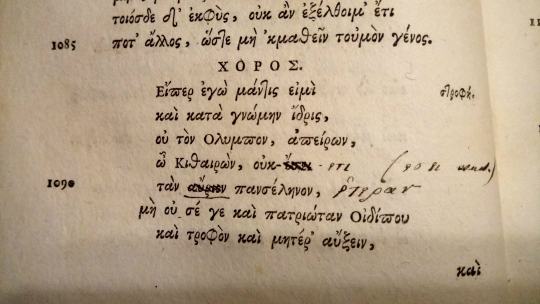
(Notice, also, the handwritten corrections by one of the book’s owners.)
All three books have names inscribed in the front. The first volume has this one:

Boissier is an old and eminent family in Geneva, Switzerland, which just happens to be where I found these books. The volume may have been owned by Adélaïde Boissier (1799-1857) or by one of her parents. Either way, the person who penned the inscription must have lived around 1800 at the latest; the long S (ſ, used here to spell Boiſsier) went out of fashion in French in the early 19th century.
Adélaïde Boissier married Charles Gautier. The books passed down to their children, as evidenced by the signature in the second volume:

This would be Émile Gautier (1822-1891), a Swiss astronomer who studied under Urbain Le Verrier, one of the scientists credited with the discovery of Neptune. Given the date (1839), it is likely that Émile was given this book while studying Ancient Greek at school. He would’ve been seventeen years old at the time.
Émile gave the books to his son Lucien (1850-1924), who was rather more fond of doodling:

This was in 1866; Lucien Gautier was sixteen years old. He would later go on to become a protestant theologian and the professor of Hebrew in Lausanne. Notice that there is another name and date in the corner of the page: I’m struggling to read the surname, but it seems to be Adolphe Boissier, 1812. This gives us the latest possible year these books could have been published - over two centuries ago.
The text is also interspersed with a few doodles, which also seem to be Lucien’s:
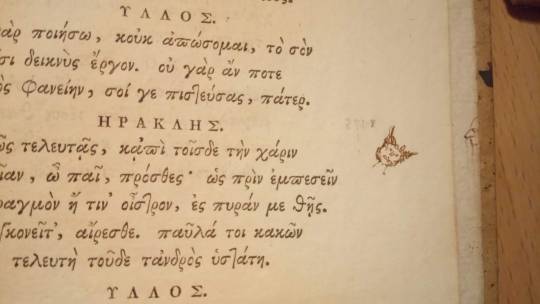
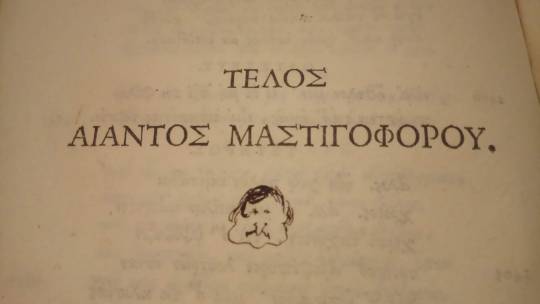
Who the books went to after him, I have no idea. All I know is that eventually, they found themselves in the private library of a man who donated it to the University of Geneva in his old age. His Ancient Greek books were distributed to anyone who wanted them, for free... and that’s how these small pieces of history came to me.
So I just discovered that not only some of the Greek books that I own are over 200 years old, they also belonged to someone famous?!
381 notes
·
View notes
Text
So I just discovered that not only some of the Greek books that I own are over 200 years old, they also belonged to someone famous?!
#or relatively famous at least#but he has a wikipedia page and was a fairly important person back in his day#what the hell
381 notes
·
View notes
Text

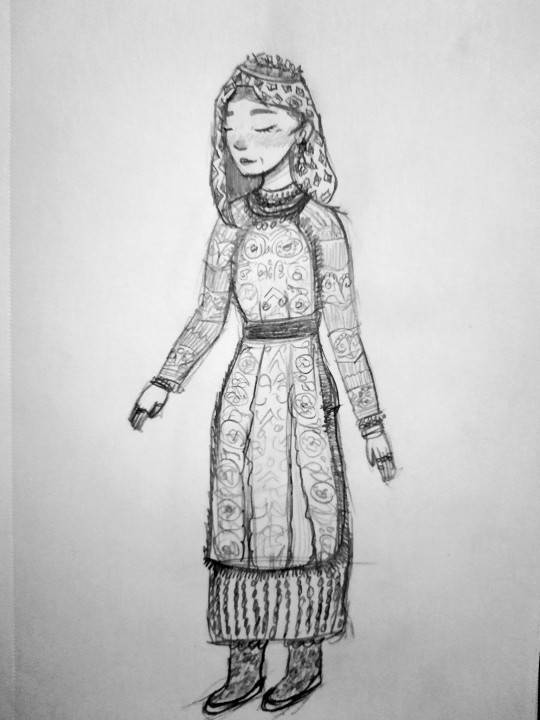
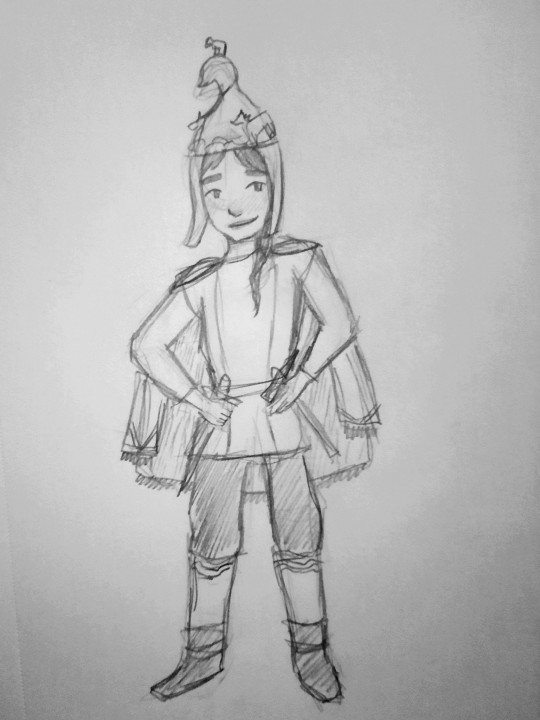
women of the pazyryk culture!!
costumes based on the "ice maiden" in the ak-alakha 3 barrow, the woman in the pazyryk 2 barrow and the young amazon warrior in the ak-alakha 1 barrow
#kam this is fantastic#they are adorable#and i love your art style#scythian#pazyryk culture#ancient history
67 notes
·
View notes
Text
... ἐμεῖο δὲ καὶ μετόπισθε μνήσασθ᾿, ὁππότε κέν τις ἐπιχθονίων ἀνθρώπων ἐνθάδ᾿ ἀνείρηται ξεῖνος ταλαπείριος ἐλθών· ‘ὦ κοῦραι, τίς δ᾿ ὔμμιν ἀνὴρ ἥδιστος ἀοιδῶν ἐνθάδε πωλεῖται, καὶ τέωι τέρπεσθε μάλιστα;’ ὑμεῖς δ᾿ εὖ μάλα πᾶσαι ὑποκρίνασθαι ἀφήμως· ‘τυφλὸς ἀνήρ, οἰκεῖ δὲ Χίωι ἔνι παιπαλοέσσηι· τοῦ πᾶσαι μετόπισθεν ἀριστεύουσιν ἀοιδαί.’
... but remember me forever more, when one of the people who dwell on earth, some stranger who has suffered much, comes here and asks: ‘Girls, which man is the most pleasant singer to you who comes here, and in whom do you delight most?’ Then you will all answer, with one voice: ‘He is a blind man, and lives on rocky Khios. All his songs are forever more supreme.’
Homeric Hymn to Apollon 166-173, transl. my own. The name of the hymn’s author is unknown.
#a nameless voice from the past asking to be remembered forever#n.b. the hymn was ascribed to homer on the basis of this passage but more evidence is lacking#it has also been attributed to someone called kynaithos#so here we are - attempting and failing to honour a long-dead singer's request#ancient greek#ancient greece#classics
112 notes
·
View notes
Text
I’m very sorry I have to correct this, but this interpretation is based on an inaccurate translation. The Greek text reads:
τῆισιν δ᾿ ἐγγύθεν ἦλθ᾿ Ἑκάτη λιπαροκρήδεμνος, πολλὰ δ᾿ ἄρ᾿ ἀμφαγάπησε κόρην Δημήτερος ἁγνῆς· ἐκ τοῦ οἱ πρόπολος καὶ ὀπάων ἔπλετ᾿ ἄνασσα.
I can only assume what was translated as “substitute queen” is ὀπάων ἔπλετ᾿ ἄνασσα. The actual translation, however, should be “the queen (Hekate) became (Persephone’s) companion”. Ὀπάων, from the verb ὀπάζω “to follow”, refers to a comrade or attendant; “substitute” is nowhere near the realm of its meanings, and I have no idea where the above translation got it from. [EDIT: I found the source and it’s Gregory Nagy’s translation. Still have no idea how he came up with that though.]
Other online translations of the hymn give its correct meaning, e.g. Theoi has “from that time the lady Hecate was minister and companion to Persephone”.
Still, the actual translation doesn’t entirely disassociate Hekate from the Underworld. By becoming Persephone’s attendant, Hekate takes on a role in her cult, and may well have acquired some chthonic aspects from that.
So, I wanna point out a thing. In the Homeric Hymn to Demeter, there’s a line that says the following:
“Then Hekatê approached them, the one with the splendid headband. And she welcomed back the daughter of holy Demeter with many embraces. And from that day forward, the Lady [Hekatê] became her [Persephone’s] attendant and substitute queen.” (438-40)
The phrase I bolded suggests that Hekate assumes Persephone’s roles as Queen of the Underworld when Persephone is with Demeter. While we already know Hekate has power over the dead and is a goddess of the Underworld in Her own right, it seems that She may actually rule beside Hades while Persephone is away.
This is just really interesting to me, that Hades and Hekate may have a platonic monarchical relationship over the Underworld at times. Also, this illustrates that Hekate’s role over the dead may be far earlier in origin than many people give credit for. It’s just a small quote and piece of info, but I think it’s nifty.
#also if 'substitute queen' were the correct translation you can trust the hymn would elaborate on that#it might've said something like 'when persephone returned to her mother then hekate of the bright headdress took her place on the throne'#you would also expect the expression 'substitute queen' to appear elsewhere and to have been discussed by modern scholars#but it doesn't and hasn't been#ancient greece#ancient greek#homeric hymns
276 notes
·
View notes
Text
should i post my "hellenization isnt a thing in india" essay? would yall be interested, its very art history dense
106 notes
·
View notes